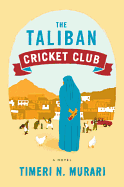
| Publisher: | Ecco Press | |
| Genre: | General, Fiction | |
| ISBN: | 9780062091253 | |
| Pub Date: | May 2012 | |
| Price: | $24.99 |
| Starred | Fiction |
by Timeri Murari
Although the Taliban are well known for violence and intimidation, few people are aware of their brief flirtation with cricket. Many Afghans were baffled when the regime lifted its own ban on sports in 2000, promoting cricket in a bid for international political acceptance.
Timeri N. Murari (Taj, My Temporary Son) spins a compelling fictional narrative around this odd fact, telling the story through the eyes of Rukhsana, an outspoken journalist who fell in love both with cricket and an Indian man in Delhi. Furious at the Taliban's growing oppression of journalists and worried about her mother's declining health, Rukhsana disguises herself as a young man to teach her brother and cousins to play cricket. If they win the national tournament, they can escape to Pakistan, and Rukhsana can avoid a forced marriage to a Taliban official.
Murari endows Rukhsana with his own love of the game, explaining that it represents freedom, individual responsibility, the ability to be creative--all principles the Taliban longs to crush. He tenderly portrays the bonds between an ill mother and her children, and the tightly knit team of cousins who rally around Rukhsana. While most of the book takes place in Rukhsana's home and on the cricket fields, the Taliban and their reign of terror lurk in the background--a constant, menacing shadow.
A love letter to cricket and to Kabul, The Taliban Cricket Club dares to imagine a different Afghanistan, where a simple game could bring about fair play, peace and a measure of freedom for all. --Katie Noah Gibson, blogger at Cakes, Tea and Dreams
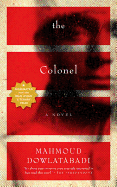
| Publisher: | Melville House | |
| Genre: | Literary Collections, Middle Eastern | |
| ISBN: | 9781612191324 | |
| Pub Date: | May 2012 | |
| Price: | $17.95 |
| Fiction |
by Mahmoud Dowlatabadi, trans. by Tom Patterdale
Policemen knocking on the door in the middle of the night have summoned an old Iranian colonel to bury his executed 14-year-old daughter. Two of the colonel's sons have already been killed, one in the 1979 revolution, one in the war against Iraq. His eldest son, Amir, released from prison a year ago, is hiding in the basement, having lost faith in everything he ever believed. Hiding with him is a brutal man with a gun in his shoulder holster, a former torturer and secret policeman. To complicate matters, the colonel has murdered his wife.
Dowlatabadi's characters struggle to live in a hostile, paranoid world where people have lost their dignity and all sense of self-worth, constantly making sure everyone considers them beyond suspicion. Their story unfolds in an atmosphere of perpetual fear and insecurity.
The reader, like the grieving old colonel, is soon no longer sure what is really happening, what is a flashback and what is an hallucination. Family members are swept away in a procession of coffins carried on the shoulders of a wailing throng. The baffling ending includes a talking cat, a suicide and a poem about severed heads. Iranian readers would know what to make of all this, and might be deeply moved. A Western reader will be left wondering just exactly why the colonel felt justified in murdering his wife. --Nick DiMartino, Nick's Picks, University Book Store, Seattle

| Publisher: | Other Press | |
| Genre: | Fiction, Contemporary Women, Family Life, Literary | |
| ISBN: | 9781590515204 | |
| Pub Date: | May 2012 | |
| Price: | $14.95 |
| Fiction |
by Alix Kates Shulman
Heather and Mack have it all: a gorgeous home, two beautiful children--a boy and a girl--with nannies to tend them, and money enough for everything else they want. Still, they are both restless, looking for something to spice up their days--and nights.
Mack is a developer and wants to build a legacy, not just another mall, something that screams Culture. Heather is a frustrated writer, a stay-at-home mom who writes the occasional column for an online "green" journal.
On a trip to Los Angeles, Mack meets Zoltan Barbu, a writer, a political refugee and a charmer with no money and no prospects. Mack impulsively invites him to come to New Jersey and stay with him and Heather in their too-big house. He believes Zoltan will provide literary companionship for Heather and might provide Mack with the cachet he has been looking for.
At first, it is heady stuff to have Zoltan's company and conversation far into the evening. "Sleepiness seemed a small price to pay for the exhilarating uplift of Zoltan's presence," Shulman (Memoirs of an Ex-Prom Queen) writes. But his presence soon begins to pall. He sleeps half the day and goes out at night. There is no tangible proof of a book being written. Heather and Mack begin to feel duped by their star boarder. This trio, with their belief in their own entitlement, play out the scene in an amusing way, and no one teaches anyone how to live--primarily because none of them has yet figured it out. --Valerie Ryan, Cannon Beach Book Company, Ore.
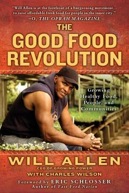
| Publisher: | Gotham Books | |
| Genre: | Agriculture, Agronomy, Regional & Ethnic, General, Technology & Engineering, Agribusiness, Cooking, Industries, Business & Economics | |
| ISBN: | 9781592407101 | |
| Pub Date: | May 2012 | |
| Price: | $26 |
| Food & Wine |
by Will Allen
In 2008, Will Allen received a MacArthur Foundation "genius grant." Two years later, Time magazine said he was among the 100 "Most Influential People" in the world. Forbes has included him in their list of the seven most powerful foodies. Clearly, he is somebody we ought to be familiar with.
The Good Food Revolution is an account of Allen's journey from his family's sharecropper past to his present position as CEO of Growing Power, a nonprofit organization that strives to inspire communities to build sustainable food systems that are equitable and ecologically sound. In an easy and honest tone, Allen takes the reader on a trip through his Southern roots, past his career in professional basketball, then corporate marketing and sales, and on to his start as an urban farmer with a desire to help his community grow and eat healthy but affordable food. By the end of the book, Allen is head of a nonprofit that has three active farms, multiple satellite training sites, an amazing number of educational and youth programs, a huge volunteer base, and a food production and distribution program that supplies needy families, as well as local grocery stores and restaurants, with fresh produce, honey, and animal and fish products. Readers will find themselves hungry as they finish Allen's book, ready for both personal sustenance and for participation in the Good Food Revolution. --Roni K. Devlin, owner of Literary Life Bookstore & More
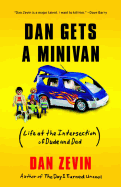
| Publisher: | Scribner | |
| Genre: | Literary Collections, Humor, Biography & Autobiography, Essays, Topic, Marriage & Family, Personal Memoirs | |
| ISBN: | 9781451606461 | |
| Pub Date: | May 2012 | |
| Price: | $24 |
| Biography & Memoir |
by Dan Zevin
Dan Zevin is a funny guy. Dan Gets a Minivan is his second book, and the stories of his family life in Brooklyn are brilliant examples of the humor often associated with Dave Barry--or even David Sedaris. Whether he's talking about having to institute date night with his wife (read: shopping for a new bed at Crate & Barrel) or he's giving Some Friendly Advice to the Aloof Hipster Dad at the Playground, Zevin somehow manages to sound both wise and foolish at the same time.
He's not concerned with looking good, letting readers glimpse what a doofus he truly is as his inner voice continually provides a neurotic patter to counterpoint his actual behavior in the moment. Though he's never as full-blown neurotic as Woody Allen's film persona, Zevin does share some common ground with the famous filmmaker.
One of the best things about Dan Gets a Minivan is the journey Zevin takes readers on. He begins talking about his life pre-children, a carefree existence that included travel, interesting restaurants and the joys of Brooklyn nightlife. Along the way, his family grows to four, the city becomes less and less attractive for parents of young children, and Dan finds that he defines himself more and more as Dad, not Dan. One smart takeaway? "The older I get, the less of a sh*t I give." --Rob LeFebvre, freelance writer and editor
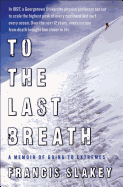
| Publisher: | Simon & Schuster | |
| Genre: | Sports & Recreation, Biography & Autobiography, Self-Help, Motivational & Inspirational, Personal Memoirs, Mountaineering | |
| ISBN: | 9781439198957 | |
| Pub Date: | May 2012 | |
| Price: | $25 |
| Starred | Biography & Memoir |
by Francis Slakey
Francis Slakey was a physics professor at Georgetown University who paid more attention to his blackboard than he did to his students. He described himself as withdrawn and considered it a good thing. Then, as he tells it in his memoir, To the Last Breath, a chip on his shoulder sends him hunting a world record. His goal--to climb the highest peak on every continent and surf every ocean--was intended to be a physical test, a self-absorbed, even narcissistic pursuit of excellence in sport.
Along the way, though, Slakey experiences many cultures, flirts with spiritual enlightenment and comes to suspect that seeming coincidences along the way mean something. The physical challenge turns out to be the least significant aspect of his journey, as the threat of guerrilla warfare becomes as real as the fear of falling off a cliff. Slakey ends up changing his ideas about what matters most in life; his experiences with the power of nature and the power of human contact turn his world upside down--for the better.
Slakey brings a scientist's matter-of-fact treatment to a tale of international travel and cultural interaction. He transports his reader to Yosemite, Kilimanjaro and Everest (as well as Antarctica), encounters violence in Indonesia and terrifying driving habits in Morocco and returns home more intact than he began. A love story, an athletic journey, an introspective process of discovery, To the Last Breath is Slakey's evolution. --Julia Jenkins, librarian and blogger at pages of julia
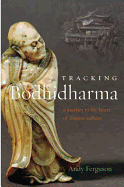
| Publisher: | Counterpoint | |
| Genre: | General, Religion, Eastern | |
| ISBN: | 9781582438252 | |
| Pub Date: | May 2012 | |
| Price: | $26 |
| Religion |
by Andy Ferguson
Since the end of World War II, there has been a flowering of Eastern thought in the Western world--a spreading of Buddhism and other philosophies that has inspired multiple generations of new practitioners and scholars. One such figure is Andy Ferguson, an American Buddhist and scholar who follows in the footsteps of a venerated, near-mythic patriarch of Chinese Buddhism in Tracking Bodhidharma.
Bodhidharma arrived from Southern India in 500 C.E., bringing with him a no-nonsense version of Buddhism that emphasized sitting and observing one's own mind, the core teachings that would underpin Ch'an or Zen Buddhism. Bodhidharma's life is so enshrouded in myth that some scholars consider him more of a legendary figure, and one of Ferguson's primary concerns as he undertakes his journey is to make the historical Bodhidharma real so that he can assume his proper place of veneration among Buddhist practitioners and lovers of Chinese culture.
Ferguson packs Tracking Bodhidharma densely with all sorts of tidbits, never ceasing to amaze with the breadth of his knowledge. While there is certainly an aspect of the "fish out of water" tale to his romp through China, Ferguson often knows more about his subject than the native Chinese he encounters. Yet he is never less than respectful toward his host country, and his observations about modern China and its place in the 21st century are every bit as judicious and level-headed as his historical insights. --Donald Powell, freelance writer
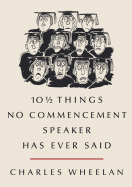
| Publisher: | W.W. Norton | |
| Genre: | Self-Help, Ethics & Moral Philosophy, Personal Growth, Philosophy, Success | |
| ISBN: | 9780393074314 | |
| Pub Date: | May 2012 | |
| Price: | $15.95 |
| Psychology & Self-Help |
by Charles Wheelan, illust. by Peter Steiner
Anyone who has donned a robe and a tasseled mortarboard and walked across a stage is familiar with the often yawn-inducing tradition of the commencement speech. With few exceptions, commencement speakers play it safe, offering vague platitudes but no real advice to graduates facing uncertain futures in an ever-changing world. Charles Wheelan (Naked Economics) aims to correct that fault with a succinct collection of practical advice you won't hear in most keynote addresses.
With optimism and humor, Wheelan offers advice that manages to remain both broad and clearly applicable. His 2011 Class Day speech at Dartmouth (his alma mater) forms the basis for 10½ Things No Commencement Speaker Has Ever Said, including the irreverent assertion that time spent at parties was not time wasted and the suggestion that marrying someone smarter than you may lead to less stress and more success. Wheelan also asks graduates to consider their future impact on society by striving not to make the world a worse place and, should they become parents, not to participate in what he terms "the Little League arms race," in which parents vent their competitive urges through their children's extracurricular activities. He urges graduates to take some risks and remain alert to serendipity, sharing the story of the most memorable moment of his trip around the world, which occurred before he and his wife left the country.
New Yorker cartoonist Peter Steiner contributes 15 illustrations to this funny and insightful guidebook to life after academia, the perfect gift for any grad. --Jaclyn Fulwood, blogger, Infinite Reads
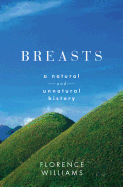
| Publisher: | W.W. Norton | |
| Genre: | Medical, Physiology, Life Sciences, Human Anatomy & Physiology, Science | |
| ISBN: | 9780393063189 | |
| Pub Date: | May 2012 | |
| Price: | $25.95 |
| Health & Medicine |
by Florence Williams
Breasts provide the human animal with many vital functions, including nutrition, beauty and sexual pleasure. As one of the major organs that make mammals different from other species, breasts also provide a record of our environmental history. That makes boobs very important to the future viability of mankind. "Breasts are us," Florence Williams writes. "Our breasts soak up pollution like a pair of soft sponges."
The story is personal: while nursing her second child, Williams became incensed by an article about the dangerous levels of flame retardants in breast milk. She enrolled in a University of Texas Public Health Study and discovered a maelstrom of poisons brewing in her orbs.
Williams sets out on a passionate crusade to expose the history of the breast, noting, for example, the connection between the age of a young woman's menarche and the age of her first full-term birth and the subsequent possibility of contracting breast cancer, along with new information about residues in the products we use that linger in the breast milk passed to our children and grandchildren. Disturbingly, much of the science behind what is known of the breast is rooted in what Williams calls S.W.A.G.: "scientific wild-ass guesses. "
Part memoir, part anthropological manifesto--and all fearlessly entertaining medical journalism--Breasts marries deadpan humor with gross anatomy in a romp through human history's most coveted and ogled over body part. "If to have breasts is to be human," writes Williams, "then to save them is to save ourselves." --Nancy Powell, freelance writer
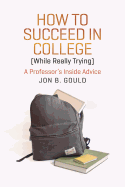
| Publisher: | University of Chicago Press | |
| Genre: | Education, General, Higher, Reference | |
| ISBN: | 9780226304663 | |
| Pub Date: | May 2012 | |
| Price: | $14 |
| Education |
by Jon B. Gould
Some of Jon B. Gould's advice in How to Succeed in College (While Really Trying) is, well, depressing. Why are students being accepted into higher education if they lack knowledge about how to edit, how to revise and the difference between the two? Shouldn't they already have a good sense of what it means to plagiarize and why it's a bad idea? Does anyone, anywhere, think "grammar check" software will save their bacon?
Nevertheless, we know that what teenagers hear from their cohorts usually carries more import than finger-waggling advice from high school teachers, and so we have this guide to easing into the first year of college with a minimum of culture shock. Gould brings many years of college-level teaching experience to bear on providing answers to questions that many students won't even realize they have--until they find themselves on campus and confused. He gives a general overview of the responsibilities facing a new college student, and where generalities aren't enough, he explains how to go about finding answers at the new school.
Where the book truly shines, though, is in its clear distinction between what is expected in high school and how those expectations will be raised (or not) come the first semester of college. Supplying teenagers with this guide will go a long way toward preparing them to make the most of their college experience. --Matthew Tiffany, counselor, writer for Condalmo
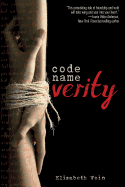
| Publisher: | Hyperion | |
| Genre: | Friendship, Holocaust, Fantasy & Magic, Social Issues, Action & Adventure, Juvenile Fiction, Historical | |
| ISBN: | 9781423152194 | |
| Pub Date: | May 2012 | |
| Price: | $16.99 |
| Starred | Children's & Young Adult |
by Elizabeth Wein
"I am a coward." That is the opening line of Wein's (The Winter Prince) extraordinary novel, and the first confession written down by Verity for her Nazi captors.
Verity is a Scot working for the Allies. She was captured when her plane went down in France, where she's being held by SS-Hauptsturmführer von Linden. But her small acts of rebellion betray her bravery. Fräulein Engel translates Verity's account from English to German for von Linden, and SS-Scharführer Etienne Thibaut metes out Verity's punishment for various transgressions. Verity calls them "Laurel and Hardy," and believes that von Linden hopes she'll "do some ratting" on them ("He does not trust Thibaut because Thibaut is French, and he does not trust Engel because Engel is a woman"). Thus Verity amuses herself--and readers.
Most of Verity's account, however, weaves in episodes from her friendship with Maddie Brodatt, a pilot she met when they teamed up to bring a German-speaking pilot down safely on an English landing strip. Their friendship sustains Verity throughout her imprisonment. At one point, she writes, "It's like being in love, discovering your best friend." Verity's recollections of it serve as a record of the rare moments of pleasure during wartime. Wein conveys a complexity with her characters that may at first elude us, and the ground shifts with each revelation. Like Megan Whalen Turner, Wein creates a captive who uses wit as a weapon, and makes us feel that, at least intellectually, Verity has the upper hand. Wein's work is mesmerizing. --Jennifer M. Brown, children's editor, Shelf Awareness
For more on Code Name Verity, check out our Maximum Shelf.
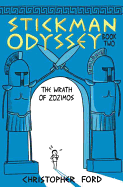
| Publisher: | Philomel | |
| Genre: | General, Greek & Roman, Legends, Myths, & Fables, Juvenile Fiction, Action & Adventure, Comics & Graphic Novels | |
| ISBN: | 9780399254277 | |
| Pub Date: | May 2012 | |
| Price: | $12.99 |
| Children's & Young Adult |
by Christopher Ford, illust. by Christopher Ford
In Christopher Ford's series, the Odyssey meets Fractured Fairy Tales with a little Diary of a Wimpy Kid thrown in.
In the first book, Zozimos' stepmother, an evil witch banished Zozimos and denied him his rightful place as heir to Sticatha. Here his uncle kidnaps Zozimos, and they're "off to Sticatha to get revenge on the witch who killed his father." Once there, the hero learns that he can become king. However, in order to prove he is worthy, he must go on a quest for the golden feather that holds the power of the gods and return it to the wicked queen. He is also on a personal mission to control his anger and to find peaceful alternatives to war.
For those who have not read the Odyssey, this is not a replacement, but it will give readers some idea of the tale's scope, with endless trials and tribulations, and the humor and zany adventures here will hook many young readers. The book brims with characters with funny names, moral dilemmas, extraordinary situations (such as Zozimos being turned into a goat) and foes aplenty to hold the attention. When Zozimos returns to Sticatha and shares his epic tale with his son, Zotikos, the boy scoffs, "That's the fakest story I've ever heard!" This introduction to outlandish tales should find welcoming readers in Percy Jackson fans, with their fascination with mythology. And Zozimos and the Sticanauts are off on another adventure! --JoAnn Jonas, public librarian and blogger